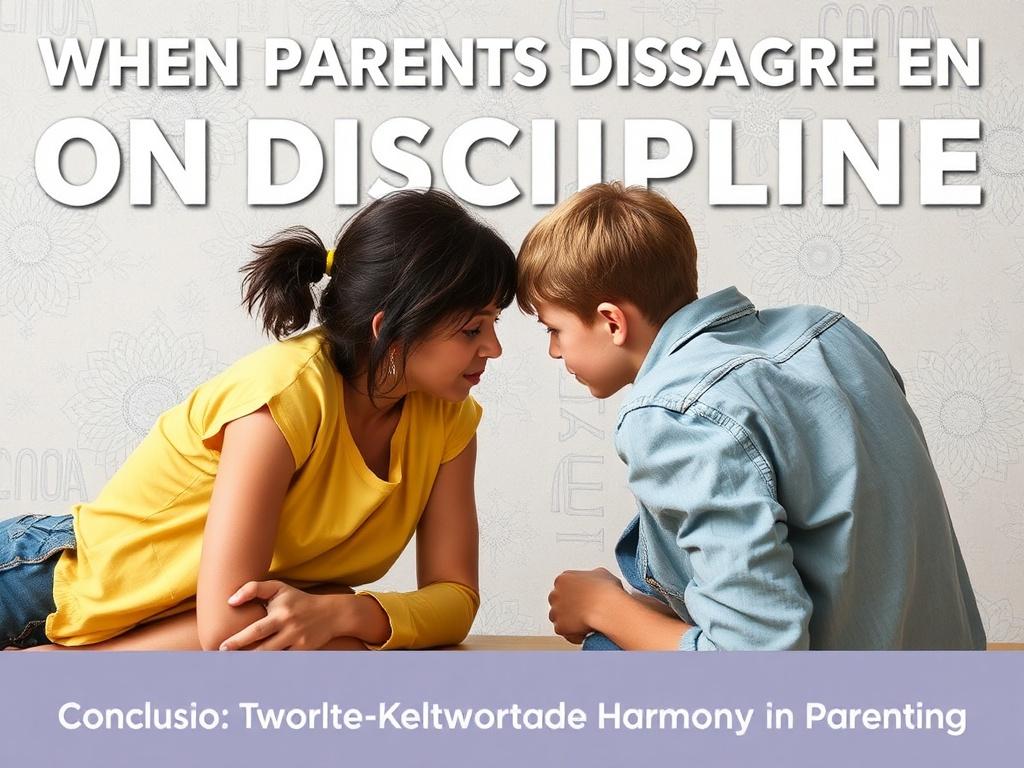SQLITE NOT INSTALLED
Parenting is one of the most rewarding yet challenging roles anyone can take on. It calls for patience, understanding, and, importantly, teamwork between parents. However, one of the biggest hurdles many couples face is when they disagree on discipline. This disagreement can create tension not only between the parents themselves but also affect their children’s emotional well-being and development. In this comprehensive article, we’ll explore the many facets of what happens when parents disagree on discipline, why it matters, and practical strategies to navigate this complex landscape.
Understanding Discipline Disagreements
Before diving into solutions, it’s essential to understand what lies behind the disagreements on discipline. When parents don’t see eye to eye on how to guide their children’s behavior, it typically stems from different child-rearing philosophies, personal upbringing, or individual beliefs about authority and consequences. For example, one parent might believe in strict, consistent rules while the other prefers a more lenient and flexible approach. These differences can be deep-rooted and emotional.
Disagreement on discipline often manifests during stressful moments—such as when a child misbehaves in public or refuses to listen at home. The tension can lead to conflicting messages sent to the child, which can cause confusion and anxiety. Children might learn to “divide and conquer,” playing one parent against the other because they recognize the disparity in rules and enforcement.
The Impact of Parental Disagreement on Children
When parents disagree on discipline, children often pick up on the tension immediately. They can become uncertain about boundaries and expectations, which hampers their ability to develop self-control and responsibility. Studies have shown that inconsistent discipline can lead to a range of behavioral problems, from increased aggression to difficulties in school performance. It may also affect their emotional security, as children thrive with predictability and clear guidelines.
Furthermore, when parents openly argue about discipline, children may feel caught in the middle, leading to feelings of guilt or loyalty conflicts. These dynamics underscore why parents must strive for a united front—or at least a respectful way to handle disagreements.
Common Reasons Why Parents Disagree on Discipline

Understanding the root causes of disagreement on discipline can help couples approach the issue with empathy and openness. Here are some of the most common reasons parents clash:
- Different Childhood Experiences: A parent raised with strict discipline may find it challenging to adopt a more permissive approach, and vice versa.
- Cultural Beliefs: Culture heavily influences parenting styles. One parent’s cultural background might emphasize obedience, while the other values independence.
- Stress and Fatigue: Parenting is exhausting. When parents are tired or stressed, their tolerance for misbehavior can wane, leading to harsher discipline or impulsive reactions.
- Personality Differences: Some people are naturally more authoritative, others more empathetic. These differences can lead to contrasting views on how to handle discipline.
- Lack of Communication: Without regular conversations about parenting goals and methods, misunderstandings and assumptions can fester.
The Role of Discipline Styles
To better understand disagreements, it’s helpful to recognize the different discipline styles parents might adopt. Typically, they include:
| Discipline Style | Description | Typical Outcome |
|---|---|---|
| Authoritative | High warmth + high control. Clear rules enforced with empathy and reasoning. | Children tend to be responsible, self-regulated, and socially competent. |
| Authoritarian | Low warmth + high control. Strict rules with little explanation. | Children may be obedient but can have low self-esteem and social skills. |
| Permissive | High warmth + low control. Few rules, lots of freedom. | Children might struggle with self-discipline and authority. |
| Neglectful | Low warmth + low control. Minimal involvement with little guidance. | Children often face attachment and behavioral issues. |
Disagreements arise when parents gravitate to different styles. If one parent believes in strict authoritarian discipline while the other leans permissive, conflicts become almost inevitable.
How to Handle Disagreements on Discipline

Despite the challenges, parents can develop a united approach to discipline if they commit to honest dialogue and cooperation. Here’s a step-by-step guide to managing disagreements:
Step 1: Open Up Communication
The first step to resolving discipline conflicts is honest and open communication. Parents should set aside time to discuss their feelings and beliefs without judgment. Ask questions like, “What do you think effective discipline looks like?” or “What was discipline like in your family growing up?” Understanding each other’s perspectives can be eye-opening.
Step 2: Find Common Ground
While it’s unlikely parents will agree on every detail, seeking common ground is critical. Agree on core values such as the importance of respect, honesty, and safety. Focus on what you both want—for example, raising respectful, kind children—rather than how to get there immediately.
Step 3: Create a Discipline Plan Together
Once values are aligned, develop a consistent discipline plan that incorporates both parents’ strengths and philosophies. This plan should be clear but flexible, outlining acceptable behaviors, consequences, and rewards. Writing the plan down helps both parents stay accountable.
Step 4: Present a Unified Front
Children notice when their parents present different rules or punishments. To avoid dividing the children, parents should agree to support each other’s decisions in front of the kids. If disagreements arise, adults should handle them privately and not undermine each other.
Step 5: Revisit and Revise as Needed
Parenting is dynamic. What works when a child is five won’t always work at ten or fifteen. Schedule regular check-ins to discuss what’s working and what isn’t. Adjust the discipline plan together over time.
Tips for Parents Who Disagree on Discipline
Sometimes, despite best efforts, disagreements persist. Here are some practical tips to help parents stay on the same team:
- Respect Differences: Accept that both parents have the child’s best interest at heart, even if approaches differ.
- Don’t Argue in Front of Children: Children feel safer when parents handle disagreements calmly away from them.
- Focus on Positive Reinforcement: Emphasize encouraging good behavior more than punishing bad behavior.
- Consider Professional Help: Family therapists or parenting coaches can mediate conflicts and offer tools to unify discipline.
- Practice Patience: Changing discipline habits takes time and consistent effort.
When Parents Disagree Publicly on Discipline
Disciplinary disagreements in public settings—like school events or family outings—can be particularly stressful. Parents may feel pressure to “win” the argument or discipline their child on the spot. However, this often escalates conflicts and confuses children.
The best practice is often to stay calm and avoid disciplinary debates in front of others. After the event, parents can regroup to discuss the incident privately and align on the response together.
The Role of Extended Family and Friends
Another layer of complexity arises when extended family members or friends have strong opinions about discipline. Grandparents, aunts, or close friends may exert influence, sometimes undermining parents’ authority. It’s important to establish boundaries and communicate your parenting decisions clearly with those outside your immediate family.
While input can sometimes be valuable, parents need to remain the primary decision-makers in their child’s upbringing. Agreeing on discipline between parents provides a stronger foundation for setting limits with others.
How Disagreement on Discipline Affects Marital Relationships
Parental disagreements over discipline are not merely about child-rearing—they can significantly impact the marital relationship. Repeated conflicts over how to handle a child’s behavior can erode trust and increase resentment between partners. It may lead to feelings of disrespect or frustration, especially if one parent feels their voice isn’t heard or valued.
Couples who work together to address discipline disagreements often report improved communication and more mutual respect. Seeing themselves as a united parenting team can bolster their romantic relationship as well.
Strategies to Protect Your Relationship
- Prioritize Your Partnership: Remind yourselves that your relationship is the foundation of your family.
- Practice Active Listening: Show empathy and try to understand your partner’s view without immediately defending your own.
- Seek Couple’s Counseling: When disagreements become toxic, professional counseling can help improve communication and compromise.
- Keep a Sense of Humor: Parenting is tough; laughing together helps ease tension.
Real-Life Examples of Parental Discipline Disagreements
Examining real-life stories often brings theory to life. Here are some anonymized examples that many parents may relate to:
| Situation | Disagreement | Resolution |
|---|---|---|
| Child refused to do homework | One parent wanted to withhold screen time; the other preferred a calm conversation and a later deadline. | They compromised by allowing limited screen time after an extra homework session and created a schedule together. |
| Temper tantrum in public | One parent supported immediate time-out; the other wanted to distract the child to avoid public distress. | They agreed to try time-outs in private after leaving the location and distraction techniques first in public. |
| Disobedience over bedtime | One parent enforced strict bedtime rules; the other allowed more flexibility on weekends. | They set consistent bedtimes during school days and relaxed rules only on agreed weekends. |
The Importance of Modeling Discipline for Children
Children learn a great deal by observing their parents. When parents show respect, consistency, and fairness in their own interactions, children are more likely to mirror those behaviors. Modeling a healthy approach to conflict resolution demonstrates to children how disagreements can be handled respectfully and constructively—skills they’ll need throughout life.
When parents successfully manage their differences in discipline, it fosters a nurturing environment where children feel secure and understood. This environment is crucial to raising emotionally intelligent and well-adjusted individuals.
Conclusion: Working Toward Harmony in Parenting

When parents disagree on discipline, it’s not only a parenting challenge but an opportunity for growth—both as individuals and as a couple. By understanding the roots of disagreements, communicating openly, establishing shared goals, and remaining patient, parents can find effective strategies that work for their unique family dynamic.
Remember, perfection isn’t the goal. Parenting is a journey filled with trial and error, learning, and adapting. When parents approach discipline disagreements with empathy and teamwork, they build a foundation of trust and unity that benefits their children’s growth and their relationship.
If you are facing difficulties with discipline disagreements, you are not alone. Seek support when needed, keep reflecting on your shared goals, and embrace the beautiful complexities of parenting together.
